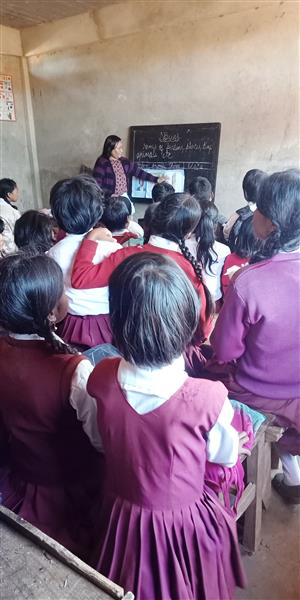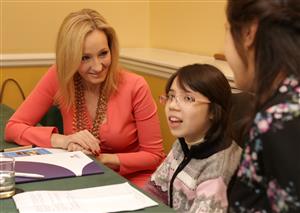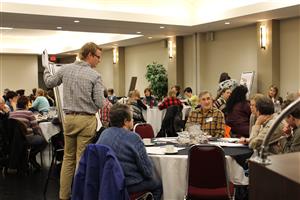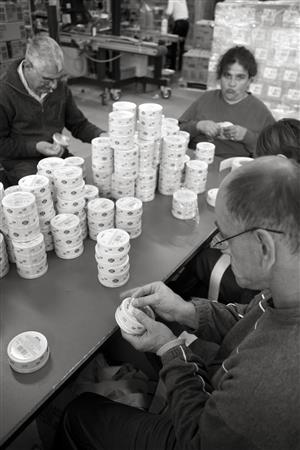Search Results
Search
Filter results
Advanced Filters
Your search returned 883 Solutions
-
Grassroots self-advocacy for children through self-created comics
Grassroots Comics enables children with disabilities to express their personality and opinions through hand-drawn comics. The children receive four days of training and then draw their own story on paper. Each year, more than 1,000 Grassroots Comics are created by children with disabilities in India.
CHAI - Catholic Health Association of India, Grassroots Comics, India -
Empowering non-formal schools in slum areas
The Action Foundation (TAF) is a youth-led NGO supporting children with physical disabilities and their families. In 2015, TAF launched the project targeting low-cost, non-formal schools in poor residential neighbourhoods. Since 2015, more than 1,600 children with and without disabilities have benefitted from the project.
The Action Foundation Kenya, Promoting Early Childhood Care and Education, Kenya -

Training teachers in inclusive techniques and learning materials
Regional Action for Inclusive Education (RAISE) works with local NGO partners that act as regional resource centres for inclusive education. These centres promote the participation of children with disabilities in 78 government primary schools and are to become autonomous centres of expertise on Inclusive Education.
Light for the World Austria, RAISE Project, India -
"Proefwonen" – fast access to affordable homes
Through "Proefwonen", housing and social service providers collaborate to facilitate rental access for people with intellectual disabilities or mental health problems. A steering group matches available housing with the candidate-tenants through a consensus process. 24 candidate-tenants have entered the program over a period of three years.
Zennevalley Home Furnishings, Belgium -
Peer counselling as an approved profession
With the help of the regional Independent Living Centre, Upper Austria introduced peer counselling as a social profession in 2008, and it remains the only region to do so worldwide. Since 2009 more than 70 professionals have been certified. In 2014, 76 peer counsellors offered up to 1,320 hours of service per week.
Austrian Ministry of Social Affairs, Health, Care and Consumer Protection, AMENDMENT OF THE SOCIAL PROFESSIONS ACT, Austria -

Changing a whole country´s approach on children´s institutions
Together with the Moldovan Government, Lumos has promoted an integrated policy and programme of deinstitutionalisation. Since launching the programme in 2007, the number of children in institutions has dropped by 86 per cent and since 2010, more than 6,000 children have been admitted to inclusive mainstream school.
Lumos Foundation, Moldova -

Collaborative Creation of the Ten-Year Action Plan
The Plan for Inclusion is the result of extensive community consultations involving up to 1,150 people and leading to 4,500 proposals. These will be addressed by advisory groups, which include people with disabilities, their families, employers, financial institutions, non-profit organizations, and the technology and business sectors.
British Columbia Ministry of Social Development and Poverty Reduction, Canada -
De-Institutionalisation and Community Living since 1980
Since 1980 the city of Trieste has closed psychiatric hospitals and set up a network of 24-hour community mental health centres capable of dealing with the most severe conditions and of supporting clients in their daily life. In 2015 the Trieste DMH managed 4 community mental health centres, each with 4–8 beds.
WHO - World Health Organisation, Collaborating Centre for Research and Training, Italy -
Personal Ombudsmen in Sweden
In Sweden a nationwide system of Personal Ombudsmen provides support in decision-making for persons with severe mental or psychosocial disabilities. POs assist individuals, identify care needs, but they have no medical responsibility, nor do they make any decisions in the capacity of an authority.
Swedish National Board of Health and Welfare, ESTABLISHING A NATIONWIDE SYSTEM OF PERSONAL OMBUDSMEN, Sweden -

Living alone with individualized support
API developed models of community-based services, such as "organized housing" and specialized foster family care, to enable children and adults with intellectual disabilities to move from large residential institutions to a life in the community. In 2003, "organised housing" was introduced by law as a new type of service.
Association for Promoting Inclusion, Croatia
- Page 1
- Page 2
- Page 3
- Page 4
- Page 5
- Page 6
- Page 7
- Page 8
- Page 9
- Page 10
- Page 11
- Page 12
- Page 13
- Page 14
- Page 15
- Page 16
- Page 17
- Page 18
- Page 19
- Page 20
- Page 21
- Page 22
- Page 23
- Page 24
- Page 25
- Page 26
- Page 27
- Page 28
- Page 29
- Page 30
- Page 31
- Page 32
- Page 33
- Page 34
- Page 35
- Page 36
- Page 37
- Page 38
- Page 39
- Page 40
- Page 41
- Page 42
- Page 43
- Page 44
- Page 45
- Page 46
- Page 47
- Page 48
- Page 49
- Page 50
- Page 51
- Page 52
- Page 53
- Page 54
- Page 55
- Page 56
- Page 57
- Page 58
- Page 59
- Page 60
- Page 61
- Page 62
- Page 63
- Page 64
- Page 65
- Page 66
- Page 67
- Page 68
- Page 69
- Page 70
- Page 71
- Page 72
- Page 73
- Page 74
- Page 75
- Page 76
- Page 77
- Page 78
- Page 79
- Page 80
- Page 81
- Page 82
- Page 83
- Page 84
- Page 85
- Page 86
- Page 87
- Page 88
- Page 89